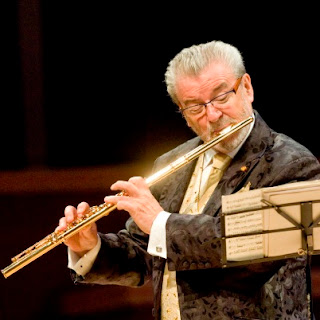James Galway in Green
 Being in love with a flutist means going to any concert performed by James Galway. The venerable Irish flutist, last in the area in 2008, is now in his 70s. His repertory is pretty close to pops concert-level at this point: the current Legacy Tour is devoted to music that Galway played and cherished through the course of his long career. As he showed at his St. Patrick's Day concert on Sunday afternoon in the Kennedy Center Concert Hall, presented by Washington Performing Arts Society, he still has it: a polished tone, agile hands, and enough charm and wit to have a large audience of all ages eating out of his hands.
Being in love with a flutist means going to any concert performed by James Galway. The venerable Irish flutist, last in the area in 2008, is now in his 70s. His repertory is pretty close to pops concert-level at this point: the current Legacy Tour is devoted to music that Galway played and cherished through the course of his long career. As he showed at his St. Patrick's Day concert on Sunday afternoon in the Kennedy Center Concert Hall, presented by Washington Performing Arts Society, he still has it: a polished tone, agile hands, and enough charm and wit to have a large audience of all ages eating out of his hands.
The serious part of the program was the first piece, the rather beautiful D major flute quartet, K. 285, supported by the young chamber musicians who are accompanying Galway on this tour, clearly subservient to their soloist musically but providing him a pretty envelope. Fast runs, silvery tone, remarkable breath support and control -- most everything was in place, with the exception of a few intonation troubles and the occasional overblow, shortcomings that, if anything, just reveal a human side to an otherwise immaculate style. Galway's misty low range, the most striking register on the instrument, was showcased in an arrangement of Debussy's Clair de Lune, with plenty of fireworks to show off in an arrangement of themes from Bizet's Carmen by François Borne (1840–1920), a French flutist in the orchestra at the Grand Théatre de Bordeaux. Galway and his flutist wife, Jeanne Galway, stood in brilliantly for the flutist brother Franz and Karl Doppler, in their dazzling fantasy on themes from Verdi's Rigoletto, with its two equal parts lined up and unified so well.
Stephen Brookes, At Kennedy Center, a charming James Galway explores his Irish roots (Washington Post, March 19) |
The next concert in the WPAS series will feature baritone Dmitri Hvorostovsky and pianist Ivari Ilja (March 20, 8 pm), in the Kennedy Center Concert Hall.





















































No comments:
Post a Comment